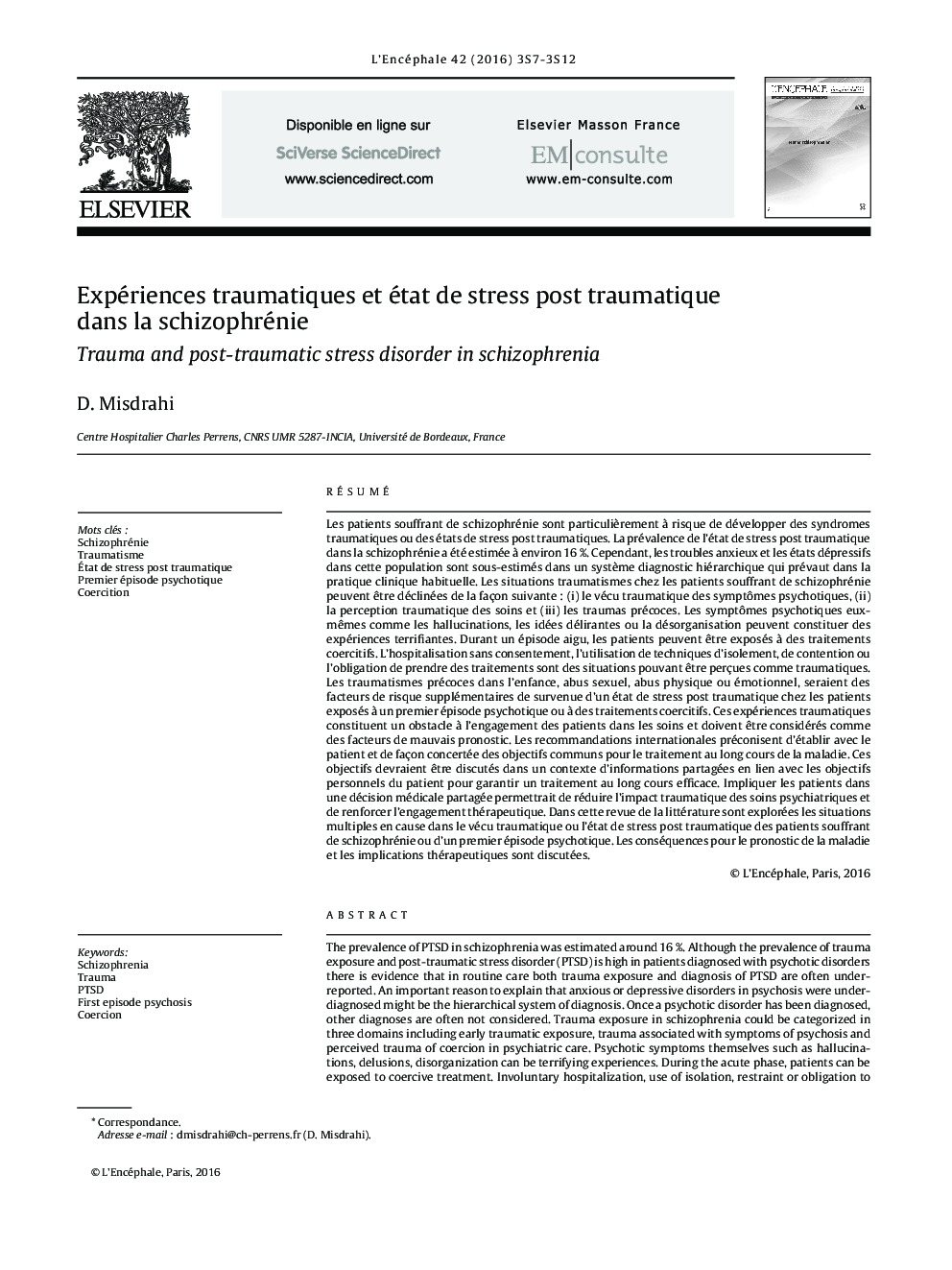| کد مقاله | کد نشریه | سال انتشار | مقاله انگلیسی | نسخه تمام متن |
|---|---|---|---|---|
| 5721199 | 1411351 | 2016 | 6 صفحه PDF | دانلود رایگان |
عنوان انگلیسی مقاله ISI
Expériences traumatiques et état de stress post traumatique dans la schizophrénie
دانلود مقاله + سفارش ترجمه
دانلود مقاله ISI انگلیسی
رایگان برای ایرانیان
کلمات کلیدی
موضوعات مرتبط
علوم پزشکی و سلامت
پزشکی و دندانپزشکی
روانپزشکی و بهداشت روانی
پیش نمایش صفحه اول مقاله

چکیده انگلیسی
The prevalence of PTSD in schizophrenia was estimated around 16 %. Although the prevalence of trauma exposure and post-traumatic stress disorder (PTSD) is high in patients diagnosed with psychotic disorders there is evidence that in routine care both trauma exposure and diagnosis of PTSD are often under- reported. An important reason to explain that anxious or depressive disorders in psychosis were underdiagnosed might be the hierarchical system of diagnosis. Once a psychotic disorder has been diagnosed, other diagnoses are often not considered. Trauma exposure in schizophrenia could be categorized in three domains including early traumatic exposure, trauma associated with symptoms of psychosis and perceived trauma of coercion in psychiatric care. Psychotic symptoms themselves such as hallucinations, delusions, disorganization can be terrifying experiences. During the acute phase, patients can be exposed to coercive treatment. Involuntary hospitalization, use of isolation, restraint or obligation to take psychotropic drugs might lead the patients to perceived traumatic events associated with care. Moreover, previous studies have confirmed that early trauma as sexual abuse, physical abuse or emotional abuse in childhood may be additional risk factors for developing post-traumatic stress disorder in patients exposed to a first psychotic episode or coercive treatment. It is well known that disengagement from treatment is a major concern in psychiatry. Applying informal coercion to psychiatric patients, even when done for the best, seems to contradict the patient- physician relationship that should rely on shared decision-making. International guidelines recommend that the goals of long-term therapy have to be discussed with the patient in the context of adequate background information, as well as her/his personal goals, in order to find a common ground, which will encourage an effective long-term medication strategy. Thus traumatic situations could be an obstacle to sustained engagement in care. Specific interventions can be used to reduce the impact of trauma since it has been demonstrated that treatment of post-traumatic stress disorder in patients with schizophrenia was efficient. Involve patients in a shared medical decision would reduce the traumatic impact of psychiatric care and reinforce therapeutic engagement that is often lacking in this disorder. In this review, events for traumatic experiences or post-traumatic stress disorder in patients with schizophrenia or first episode psychosis are explored. Implications for prognosis and therapeutic interventions are discussed.
ناشر
Database: Elsevier - ScienceDirect (ساینس دایرکت)
Journal: L'Encéphale - Volume 42, Issue 3, Supplement 1, June 2016, Pages S7-S12
Journal: L'Encéphale - Volume 42, Issue 3, Supplement 1, June 2016, Pages S7-S12
نویسندگان
D. Misdrahi,